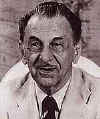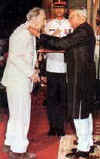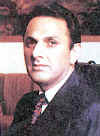|
|
||||
| Home
Feature 'Spirit of India'
Music Music
in Pakistan Health
|
|
|
||
|
the-south-asian.com April 2001 |
||||
|
Page 7 of 11
Parsis - Pioneers of modern India Industrialists India's biggest industrial empire, the Tata group, is headed by a Parsi, as is Godrej, the country's largest privately owned conglomerate. Bombay Dyeing, one of the largest among the textile groups in India, is owned by Nusli Wadia, - who also happens to be the son of Dina Neville Wadia, the daughter of Pakistan’s founder Mohammad Ali Jinnah. Jamsetji Nusserwanji Tata - the first pioneer entrepreneur of India
In 1871 he set up the ‘Central India Spinning, Weaving and Manufacturing Company, Limited’, and in 1877 built the immensely successful Empress Mills in Nagpur. He took over the sick Dharamsi Mill in Kurla, changed its name to the Swadeshi Mill when he purchased it in 1887, turned it around and exported cloth to China, Korea, Japan and the Levant. Later, he concentrated on three key areas -- the iron and steel industry, electrical power generation and technical education. He believed that political independence would be meaningless without economic self-sufficiency. His vision of the Institute of Science in Bangalore, a steel plant in Jamshedpur, Bihar, and a hydroelectric company were brought to fruition by his successors. JRD Tata - Jehangir Ratanji Dadabhoy Tata
He guided the destiny of India’s largest Industrial house
for well over half a century.Headed Tata Sons in 1938; Tata
Chemicals in 1939; Tata Engineering and
Locomotive Company (TELCO) in 1945. JRD was the second child of Mr Ratanji Dadabhoy Tata. With his French wife Sooni, JRD arrived in 1925 at Bombay House to work under Mr John Peterson, the director-in-charge of Tata Steel. That was the beginning of an industrial empire.
A.B. Godrej Godrej gave up his legal profession and set up Godrej &
Boyce Manufacturing Co. in 1897 – to manufacture locks. The rest is
history. 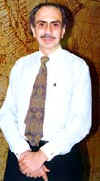 Adi Godrej is the present
Head of the Godrej Group. Adi Godrej is the present
Head of the Godrej Group.
"The Parsis have always integrated sufficiently, [and] the majorcommunities in India - the Hindus, the Muslims - have always respected the Parsis," says Adi Godrej Chairman, Godrej Group. "The community has very successfully managed the advantages of being smallwithout any of the disadvantages of being small."
Wadias The Wadias' first venture, over 250 years ago, was in the
area of ship building - more than 355 ships were designed and built by the
Wadias, including men-of-war for the British Navy. It was on one such ship
that the American National Anthem was composed. With the wave of industrialization in the 19th century, trading grew, and with it, opportunities for new areas of business. In 1879, Bombay was next only to New Orleans as the world's largest cotton port. It was at this time that Nowrosjee Wadia, the second generation Wadia, set his sights on India's mushrooming textile industry. On August 23rd, in a humble redbrick shed, he began a small operation. Here, cotton yarn spun in India was dip dyed by hand in three colors-turkey red, green and orange-and laid out in the sun to dry. The Bombay Dyeing & Manufacturing Co. Ltd. had been born. A modest beginning for a company that was to grow in the following 115 yr. into one of India's largest producer of textiles. Along the path of growth and diversification, Bombay Dyeing has spawned dozens of other companies. In technical and financial collaboration with world leaders, such companies have pioneered the manufacture of various chemicals and have grown to be leaders in their new fields. Neville Wadia , the third generation of the existing business family of the Wadias, was born in Liverpool on 22nd August 1911. He was educated at Malvern College and University of Cambridge. He started his career in 1931 as an apprentice with the Bombay Dyeing and Manufacturing Company Ltd., owned by his father Mr. Nowrosjee Wadia.The arduous apprenticeship was an essential part of his grooming. In 1933 he was appointed the Director of the company. After his father's death in 1952, Mr. Neville Wadia took over as the chairman of the company. He married Dina Jinnah, the daughter of Mohammad Ali Jinnah, the Founder of Pakistan. During his quarter century as the Chairman, the company turnover increased eleven fold. At the age of 66, after spending forty eight years with Bombay Dyeing, he handed over the rein of control to his son, Mr. Nusli Wadia. It was the result of his toil that from a humble beginning Bombay Dyeing has risen to the status of one of the most respected and widely diversified business houses - The Wadia Group.
Parsis - The Zoroastrians of India Arrival in India and the beginnings of a new
life The Early Entrepreneurs of Bombay
|
||||
| Copyright © 2000 [the-south-asian.com]. Intellectual Property. All rights reserved. | ||||
| Home |
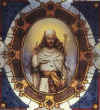
 Born: March 13, 1839 in Nausari, Gujarat, India.
Born: March 13, 1839 in Nausari, Gujarat, India.